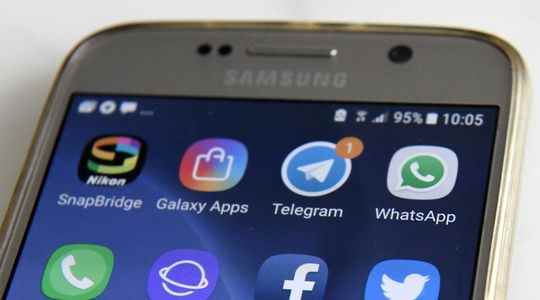It is a universe where press releases and declarations by members of the Kremlin circulate without any problem. Russian units in Ukraine? Soldiers deployed “to secure these biological weapons laboratories”. Ukrainian President Volodymyr Zelensky? “A lying Nazi comedian.” The Ukrainians? “Psychopaths.” For the past few days, Silvano Trotta, ufologist who has become a star of “reinformation” on the Covid, has revealed his keen interest in geopolitical questions.
On its Telegram loop and its 154,000 subscribers, so far mainly devoted to the coronavirus, there is now a deluge of false information on the Ukrainian conflict. The circles of disinformation seem to follow the news: after the Covid, it is now the war in Ukraine – on the pro-Russian side – which mainly mobilizes their attention. To understand the links between antivaccines and pro-Russian networks, interview with Antoine Bayet, author of Journey to the Land of Dark Informationpublished by Robert Laffont.
L’Express: How to explain these links between the anti-vaccine sphere and the pro-Russian disinformation networks?
Antoine Bayet: I spent several months trying to understand the motivations of people who pick up so much information that they will start producing parallel content, counter-information distributed outside traditional channels. I met a little more than fifteen of these actors who produce “dark information” and I studied them a lot in the first half of last year. However, I was surprised: I did not think that they would seize a new “fight” so easily. In the groups that I have could observe in 2021, we thus note this rallying to a mainly pro-Putin discourse.
But it is part of spheres with different motivations: political, economic, or personal. Take the example of the YouTube channel “Livre noir”, which, if it is not a conspiratorial channel, surfs on these codes. They thus have a very political agenda and reading of the war in Ukraine. Another example: someone like Silvano Trotta, who obviously felt that a certain treatment of the conflict was going to be popular among his subscribers. I have not yet identified people with economic motivations on the subject.
This adhesion to the pro-Russian discourse was however progressive…
The turning point came not on February 24, the day of the Russian invasion, but a week later, when Russia Today was banned in France. As in the case of the antivaccines, who claimed to mobilize against the health pass, this blockage was perceived as an attack on freedom. This value is important in both cases: agitated, it can federate and overturn people. These people are in “against”, to the point of pouring into the victim discourse: “We are censored, we are oppressed.” In their minds, what is forbidden becomes true, because if power has suppressed it, it must want to hide something.
Next, we must not forget that there are often two speeds in the diffusion of dark information. We first have coordinated, well-thought-out and considered actions on Telegram which are then exported to the most popular networks, such as Facebook. It is therefore possible that the contagion of content relaying pro-Russian propaganda will continue even more in the coming days outside of Telegram.
Is there a “robot portrait” of the French likely to switch to these spheres?
The portrait that I made is that of Mr. and Mrs. Everybody, often rather well educated. The profiles are very varied. These “info dropouts” still consume it. The start of the pandemic was accompanied by an explosion in the media audience, at the same time as that of a Facebook group where a lot of dark information, “Didier Raoult VS Coronavirus”. This should challenge us, the media, journalists, in the way we take our audiences into consideration. People can become consumers of dark information without totally abandoning the most traditional circuits.
Did containment play a role in this explosion of dark information ?
Maybe: people explained to me that they were connected from “6 a.m. to midnight” on Facebook at that time. Groups undoubtedly federated at this moment. But some have changed before confinement. In my book, I take the example of Serge Petitdemange, who leads the French Renaissance micro-party. Creator of videos on YouTube, he had tried to set up a happening in front of the Elysée, in 2018, to “go get Emmanuel Macron”. His consumption of dark information long predates the pandemic.
The fans of dark information therefore always consult the “traditional” information in parallel. Could better media literacy change their opinions?
I would love, especially in view of the conflict in Ukraine, for media literacy to be a subject of the presidential campaign. This is a crucial subject which, however, is not addressed. In particular, I spoke with MP Bruno Studer (Bas-Rhin, La République en Marche), who considers media education as a subject in its own right. More than a question of resources, there is the question of structure: today, this education depends above all on the goodwill of teachers. It’s time to step up on this.
